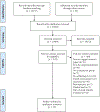Parental bipolar disorder, family environment, and offspring psychiatric disorders: A systematic review
- PMID: 32158009
- PMCID: PMC7175999
- DOI: 10.1016/j.jad.2020.03.005
Parental bipolar disorder, family environment, and offspring psychiatric disorders: A systematic review
Abstract
Background: Our objective was to systematically review non-experimental studies of parental bipolar disorder (BD), current family environment, and offspring psychiatric disorders to identify characteristics of family environment associated with parental BD and risk for offspring psychiatric disorders.
Methods: CINAHL, Embase, PsycINFO, and PubMed were searched using MeSH terms to identify studies on offspring of BD parents published through September 2017. We followed PRISMA guidelines and used the Risk of Bias Assessment Tool for Nonrandomized Studies (RoBANS). We calculated prevalence ratios and 95% confidence intervals to compare offspring psychiatric disorders within and across studies.
Results: Of 10,454 unique documents retrieved, we included 13 studies. The most consistent finding was lower parent-reported cohesion in families with a BD parent versus no parental psychiatric disorders. Family environment did not differ between BD parents and parents with other disorders. Offspring of BD parents had higher prevalence of psychiatric disorders than offspring of parents without psychiatric disorders but did not differ from offspring of parents with other disorders. Families with a BD child had higher conflict than families without a BD child.
Limitations: Comparisons between studies were qualitative. A single reviewer conducted screening, data extraction, and bias assessment.
Conclusions: Family environment in families with a BD parent is heterogeneous. The pattern of findings across studies also suggests that family problems may be associated with parental psychiatric illness generally rather than parental BD in particular. Few studies included offspring-reported measures. Given the association of family conflict with offspring mood disorders, further study is merited on children's perceptions of the family environment in the BD high-risk context.
Keywords: Bipolar disorder; Family environment; High-risk; Parenting, family climate.
Published by Elsevier B.V.
Conflict of interest statement
Declarations of Competing Interest None
Similar articles
-
Familial transmission of parental mood disorders: unipolar and bipolar disorders in offspring.Bipolar Disord. 2013 Nov;15(7):764-73. doi: 10.1111/bdi.12107. Epub 2013 Aug 5. Bipolar Disord. 2013. PMID: 23909952 Free PMC article.
-
A Longitudinal Study of Family Functioning in Offspring of Parents Diagnosed With Bipolar Disorder.J Am Acad Child Adolesc Psychiatry. 2019 Oct;58(10):961-970. doi: 10.1016/j.jaac.2018.10.011. Epub 2018 Dec 19. J Am Acad Child Adolesc Psychiatry. 2019. PMID: 30768400 Free PMC article.
-
Family functioning in the context of parental bipolar disorder: associations with offspring age, sex, and psychopathology.J Fam Psychol. 2015 Feb;29(1):108-18. doi: 10.1037/fam0000048. Epub 2014 Dec 22. J Fam Psychol. 2015. PMID: 25528073
-
The risk of anxiety disorders in children of parents with severe psychiatric disorders: a systematic review and meta-analysis.J Affect Disord. 2021 Mar 1;282:472-487. doi: 10.1016/j.jad.2020.12.134. Epub 2020 Dec 28. J Affect Disord. 2021. PMID: 33422825
-
Systematic Review and Meta-Analysis: Risks of Anxiety Disorders in Offspring of Parents With Mood Disorders.J Am Acad Child Adolesc Psychiatry. 2024 Apr;63(4):407-421. doi: 10.1016/j.jaac.2023.06.022. Epub 2023 Jul 13. J Am Acad Child Adolesc Psychiatry. 2024. PMID: 37453607
Cited by
-
Reduced parenting stress following a prevention program decreases internalizing and externalizing symptoms in the offspring of parents with bipolar disorder.Int J Bipolar Disord. 2023 Feb 27;11(1):10. doi: 10.1186/s40345-022-00284-2. Int J Bipolar Disord. 2023. PMID: 36849568 Free PMC article.
-
The Pathophysiological Underpinnings of Gamma-Band Alterations in Psychiatric Disorders.Life (Basel). 2024 Apr 30;14(5):578. doi: 10.3390/life14050578. Life (Basel). 2024. PMID: 38792599 Free PMC article. Review.
-
Longitudinal relationship between maternal distress and pediatric mood symptoms in youth with mood disorders.J Psychiatr Res. 2021 Dec;144:353-359. doi: 10.1016/j.jpsychires.2021.10.041. Epub 2021 Oct 26. J Psychiatr Res. 2021. PMID: 34735839 Free PMC article.
-
Intrinsic Connectivity and Family Dynamics: Striatolimbic Markers of Risk and Resilience in Youth at Familial Risk for Mood Disorders.Biol Psychiatry Cogn Neurosci Neuroimaging. 2022 Sep;7(9):855-866. doi: 10.1016/j.bpsc.2022.02.009. Epub 2022 Mar 8. Biol Psychiatry Cogn Neurosci Neuroimaging. 2022. PMID: 35272095 Free PMC article.
-
Family environment and polygenic risk in the bipolar high-risk context.JCPP Adv. 2023 Mar 16;3(2):e12143. doi: 10.1002/jcv2.12143. eCollection 2023 Jun. JCPP Adv. 2023. PMID: 37378048 Free PMC article.
References
-
- Alloy LB, Abramson LY, Smith JM, Gibb BE, & Neeren AM (2006). Role of parenting and maltreatment histories in unipolar and bipolar mood disorders: Mediation by cognitive vulnerability to depression. Clinical Child and Family Psychology Review, 9(1), 23–64. doi: 10.1007/s10567-006-0002-4 - DOI - PubMed
-
- Alloy LB, Abramson LY, Urosevic S, Walshaw PD, Nusslock R, & Neeren AM (2005). The psychosocial context of bipolar disorder: Environmental, cognitive, and developmental risk factors. Clinical Psychology Review, 25, 1043–1075. - PubMed


